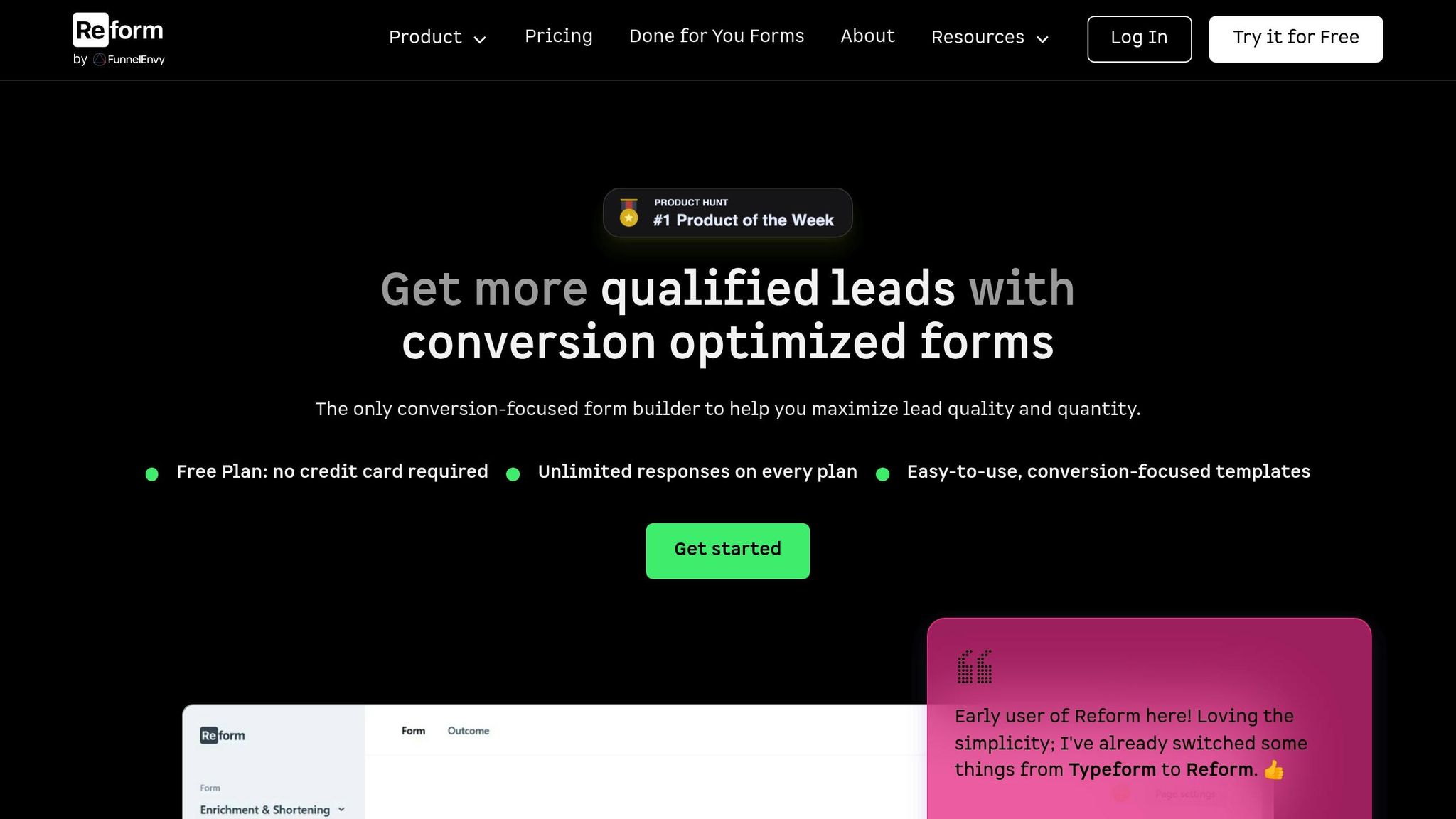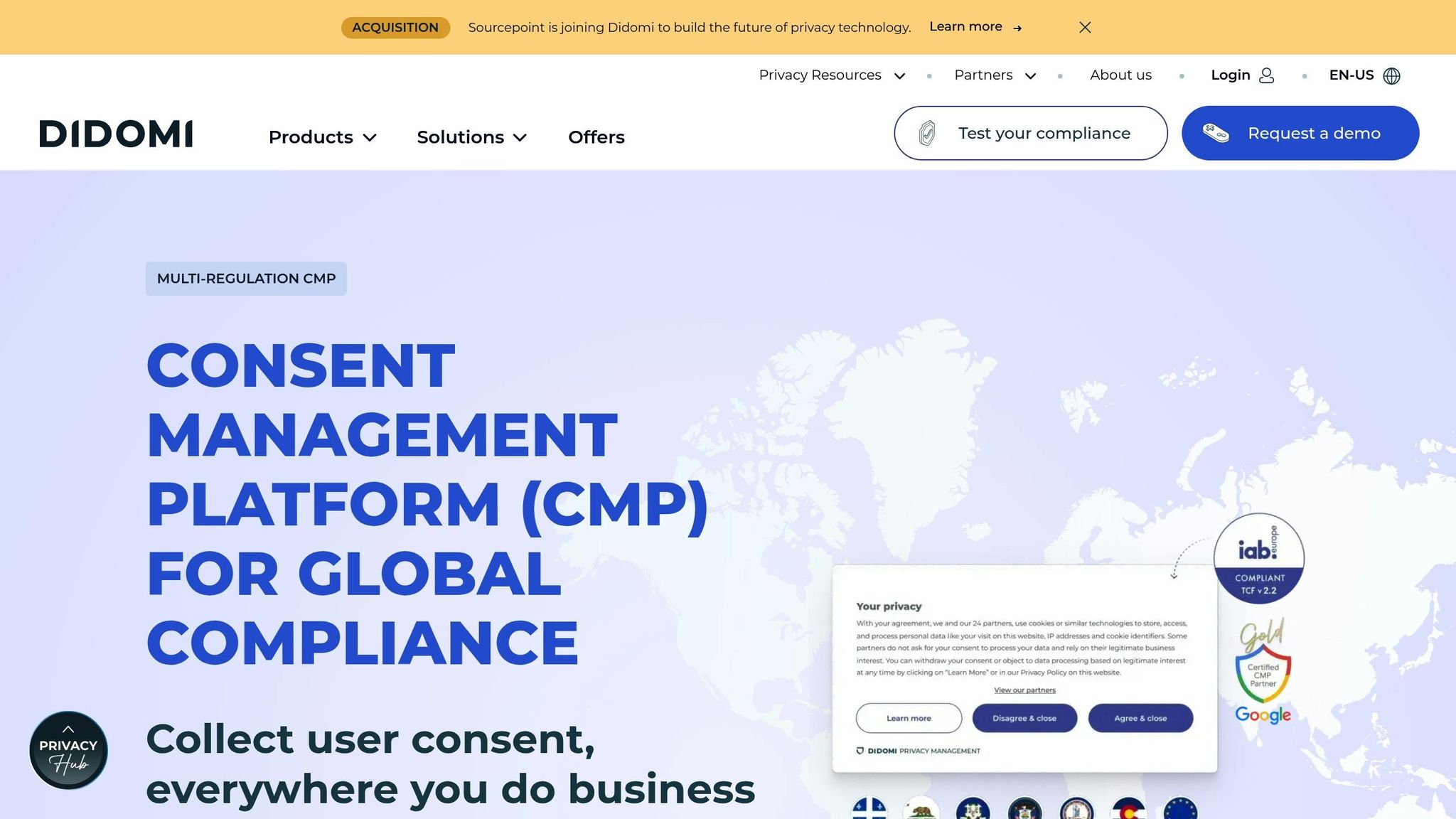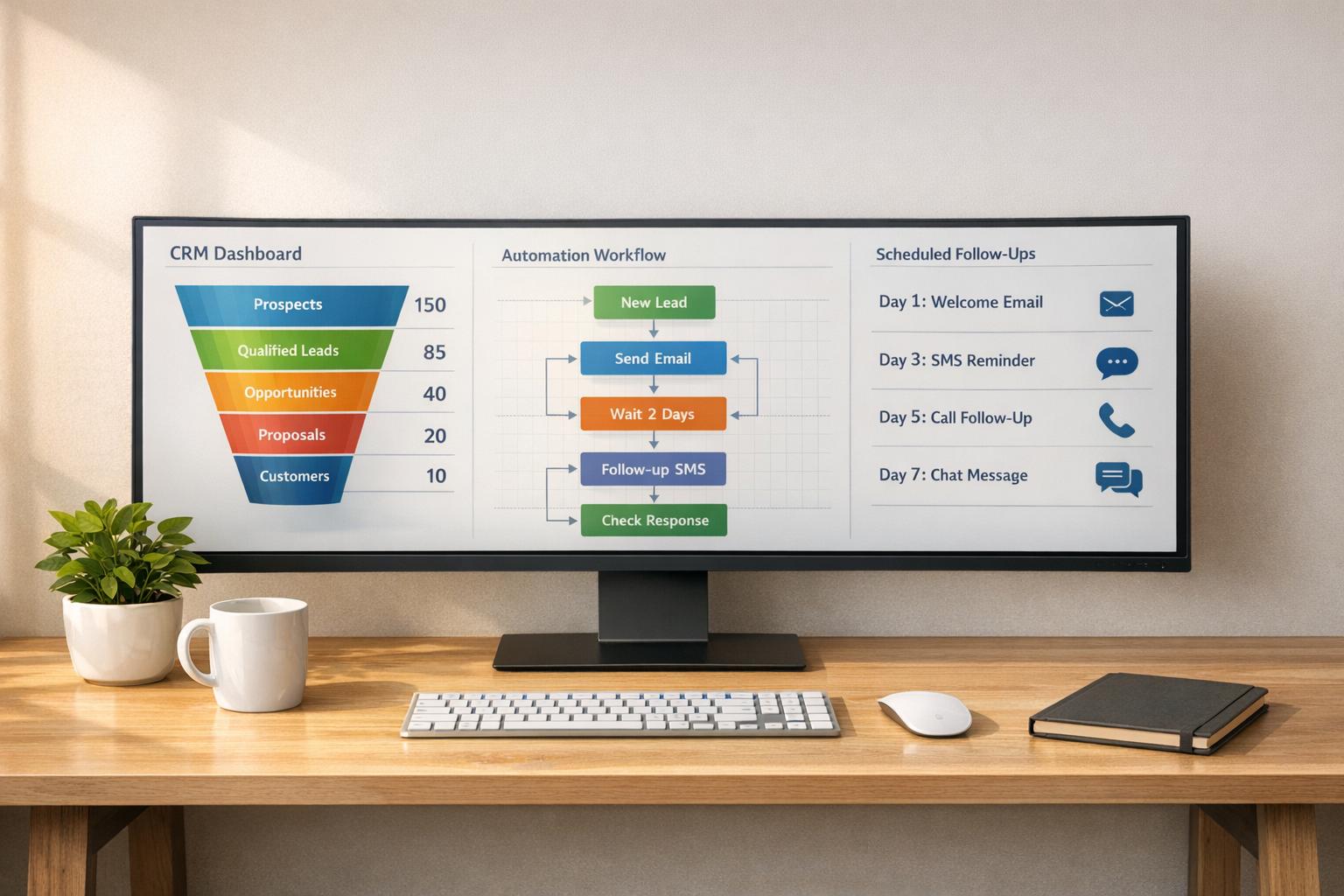Top Data Privacy Frameworks for 2025

In 2025, businesses face a rapidly evolving data privacy landscape shaped by stricter regulations and advanced technologies. Companies must prioritize privacy not just to comply with laws but to build trust and avoid penalties. Here’s a breakdown of the leading privacy frameworks and tools that can help businesses stay compliant and competitive:
- Reform: A no-code form builder designed for privacy-compliant data collection. Features include conditional routing, spam prevention, and seamless integration with tools like Google Sheets and Zapier. Pricing starts at $15/month.
- CCPA/CPRA: California's privacy laws grant consumers rights like data access, deletion, and opt-outs. Businesses must meet detailed compliance requirements, including monitoring data sharing and responding to consumer requests.
- GDPR: The EU's gold standard for privacy laws, covering consent management, data subject rights, and breach reporting. Applies globally to businesses handling EU residents' data.
- VCDPA: Virginia's privacy law emphasizes consumer rights and scalable compliance for businesses processing large datasets.
- Colorado Privacy Act (CPA): Focuses on consumer rights and includes opt-out mechanisms for targeted advertising and data sales.
- Privacy Enhancing Technologies (PETs): Advanced tools like differential privacy and homomorphic encryption enable secure data processing without exposing sensitive information.
- Consent Management Platforms (CMPs): Tools like Didomi and DataGrail simplify managing user consent and regulatory compliance across platforms.
Quick Comparison
| Framework/Tool | Focus | Coverage | Key Features | Best For | Complexity |
|---|---|---|---|---|---|
| Reform | Privacy-compliant forms | Global | No-code forms, data validation, integrations | Small to medium businesses | Low |
| CCPA/CPRA | Consumer rights | California, US | Data access, deletion, opt-outs | Large businesses | High |
| GDPR | Comprehensive data protection | EU (global impact) | Consent, data portability, breach reporting | Global businesses | Very High |
| VCDPA | Consumer data rights | Virginia, US | Data access, corrections, opt-outs | Medium to large businesses | Medium |
| CPA | Balanced privacy approach | Colorado, US | Consumer rights, opt-out mechanisms | Medium to large businesses | Medium |
| PETs | Secure data processing | Global | Differential privacy, encryption | Tech, healthcare, finance | Very High |
| CMPs | Consent management | Global | Consent banners, user preferences | E-commerce, SaaS, media | Medium |
2025 Privacy Roadmap: Tackling Top Privacy Priorities
1. Reform: No-Code Form Builder for Privacy Compliance

When businesses gather customer data, they create an essential touchpoint for privacy. Reform steps in as a no-code form builder that prioritizes privacy compliance, helping businesses stay ahead in an ever-changing regulatory environment. By embedding privacy-focused features directly into its forms, Reform enables companies to capture leads while adhering to data protection standards. Let’s dive into what makes this tool stand out.
Privacy-Conscious Data Collection
Reform ensures privacy is built into the foundation of its forms. Features like email validation and spam prevention come standard, reducing the chances of collecting invalid or fraudulent data. This aligns with the principle of data minimization - only gathering what’s necessary. Additionally, its conditional routing feature collects extra details only when absolutely required, reflecting the spirit of GDPR compliance.
Flexible Options for Businesses of All Sizes
Reform’s pricing structure is designed to accommodate businesses at different stages of growth:
- Basic: $15/month for unlimited responses and access to core integrations.
- Pro: $35/month, which includes team access, response tracking, and advanced integrations.
- Done For You: Fully customized form solutions tailored to specific needs.
Seamless Integration with Existing Tools
Reform’s headless forms make it easy to integrate into existing workflows. It works smoothly with tools like Notion, Google Sheets, Zapier, and ConvertKit. For those looking for customization, Reform also supports custom CSS and JavaScript, ensuring the forms fit perfectly within any application or website.
2. California Consumer Privacy Act (CCPA) / California Privacy Rights Act (CPRA)
California's privacy laws have come a long way, evolving from the CCPA in 2020 to the expanded CPRA in 2023. These updates aim to address emerging concerns and strengthen consumer rights, setting the tone for how businesses should handle data privacy moving forward.
The CPRA introduced some big changes, including the creation of the California Privacy Protection Agency (CPPA) and a broader definition of sensitive personal information. Businesses are now expected to embrace practices like limiting data collection to what's necessary, defining clear purposes for data use, and prioritizing consumer protections.
Compliance with Regulatory Requirements
Under these laws, consumers have several rights: they can find out what data is being collected about them, request corrections or deletions, opt out of certain types of processing, and avoid unfair treatment for exercising these rights. Companies must respond to such requests within 45 days and keep detailed records of where their data comes from, how it's used, and with whom it's shared. The CPRA also expanded what counts as "selling" data, pushing businesses to carefully evaluate their data-sharing practices. These rules scale based on the size of the business, making compliance a more tailored process.
Scalability for Businesses of Varying Sizes
The CCPA and CPRA frameworks apply differently depending on factors like a company’s annual revenue and the amount of personal data it handles. Larger businesses face stricter requirements, while smaller ones often find it easier to comply by adopting a privacy-by-design model. This means integrating privacy considerations right from the start - during data collection and processing.
Adapting to Modern Technology (AI and Data Sharing)
The CPRA also addresses the complexities of modern technologies like artificial intelligence and automated decision-making. If personal data is used for profiling or making significant decisions, businesses must provide additional disclosures and offer opt-out options. There’s also a strong focus on monitoring third-party data sharing and cross-border transfers, ensuring privacy protections stay intact no matter where the data goes. This highlights the importance of having systems that can adapt to these technical demands.
Simplifying Integration with Existing Systems
Businesses are encouraged to embed privacy controls directly into their websites, apps, and forms. Using centralized consent management tools can make it easier to track user preferences and handle data requests efficiently, streamlining the entire compliance process.
3. General Data Protection Regulation (GDPR)
Since its implementation in May 2018, the General Data Protection Regulation (GDPR) has set the benchmark for data privacy laws worldwide. It applies to any organization handling the personal data of EU residents, regardless of where the business operates. This global reach has made GDPR a model for how companies should manage personal information responsibly.
What sets the GDPR apart is its thorough approach to protecting personal data. It governs every step of the data lifecycle - from collection to storage, processing, and eventual deletion. The regulation empowers individuals to take charge of their personal information while requiring businesses to be upfront about their data practices. This comprehensive framework lays the groundwork for the compliance strategies discussed below.
Compliance with Regulatory Requirements
The GDPR outlines six legal bases for processing personal data, with explicit consent and legitimate interest being the most commonly used by businesses. Companies must document the legal basis for each data processing activity and be prepared to prove their compliance.
Individuals are granted key rights, including the ability to access, correct, delete, and transfer their data. Businesses are required to respond to these requests within one month. Additionally, organizations must report data breaches to the relevant supervisory authority within 72 hours of discovery.
For high-risk activities, such as automated decision-making or large-scale processing of sensitive data, businesses must conduct Data Protection Impact Assessments (DPIAs). Organizations processing substantial amounts of personal data or engaging in regular monitoring must also appoint a Data Protection Officer (DPO) to oversee compliance efforts.
Scalability for Businesses of Varying Sizes
The GDPR applies to companies of all sizes but allows flexibility in how compliance is achieved. While smaller businesses are not exempt, they can implement proportionate measures tailored to their resources and operations.
For many small and medium-sized enterprises, adopting a privacy-by-design approach from the outset has proven effective. This strategy involves embedding data protection into systems and processes during development, which is often more cost-efficient and less disruptive than retrofitting compliance later.
The GDPR’s accountability principle requires businesses to show how they comply with its rules. For a small business, this might mean maintaining straightforward records of data processing activities. In contrast, larger organizations often require detailed data mapping and governance structures to meet the same standard.
Technological Adaptability (AI and Data Sharing)
One of the GDPR’s strengths lies in its technology-neutral design, ensuring its relevance even as new technologies emerge. For instance, the regulation addresses automated decision-making and profiling, requiring businesses to explain how decisions are made and allowing individuals to request human intervention. This focus on algorithmic transparency is particularly crucial when automated systems significantly impact individuals.
For international data transfers, companies often rely on Standard Contractual Clauses (SCCs) or adequacy decisions. These mechanisms require businesses to evaluate the legal environment of the destination country and implement additional safeguards to ensure data protection.
Ease of Integration with Existing Systems
The GDPR encourages businesses to integrate privacy controls directly into their workflows. For example, granular consent mechanisms allow users to specify which types of data processing they agree to, rather than forcing blanket consent for all activities. This aligns with the privacy-by-design principles mentioned earlier.
Many organizations have streamlined compliance by centralizing privacy management. Using integrated systems to handle consent tracking, data subject requests, and breach notifications simplifies the process and reduces the complexity of managing compliance across departments. For companies collecting data through digital forms or online platforms, embedding privacy controls at the point of collection has proven especially effective. This approach not only simplifies compliance but also helps businesses stay agile as privacy expectations continue to evolve.
4. Virginia Consumer Data Protection Act (VCDPA)
The Virginia Consumer Data Protection Act (VCDPA) establishes clear rights for Virginia residents over their personal data while offering businesses a straightforward framework for compliance. It grants individuals the ability to access, correct, delete, and obtain copies of their personal information. Enforcement is managed by state authorities, ensuring businesses adhere to the law. Similar to GDPR and the CCPA/CPRA, the VCDPA is designed to address modern data processing challenges with practical and scalable compliance measures.
Compliance with Regulatory Requirements
To meet the VCDPA's standards, businesses need to assess high-risk data processing activities, develop efficient procedures for handling consumer requests, and implement safeguards to protect sensitive information. The law also requires businesses to obtain explicit consent before processing sensitive data and to respond to consumer inquiries within specific timeframes.
Tailored Requirements for Different Business Sizes
The VCDPA recognizes that not all businesses operate on the same scale. Smaller businesses with limited data processing may be exempt from certain provisions, reducing unnecessary compliance burdens. For businesses that fall under the act's scope, privacy controls can be integrated into existing workflows, allowing them to meet legal obligations without overhauling their operations.
Addressing Modern Challenges in Technology and Data Sharing
The VCDPA tackles contemporary issues like automated decision-making and profiling. For automated processes that have a significant impact, businesses must evaluate their systems and clearly communicate how decisions are made. The act also outlines the responsibilities of data controllers and processors in data-sharing agreements, encouraging the use of contracts to safeguard personal information.
Seamless Integration with Existing Systems
The VCDPA is designed to work with tools businesses already use, such as CRM and governance platforms, to manage consumer requests efficiently. By emphasizing accountability and clearly defined roles, the act makes it easier to incorporate privacy measures into current practices. This approach simplifies vendor management and ensures third-party providers align with privacy standards, making the VCDPA an essential part of modern privacy strategies.
5. Colorado Privacy Act (CPA)
The Colorado Privacy Act (CPA) grants Colorado residents greater control over their personal data. It gives individuals the right to access, correct, delete, and transfer their data. Additionally, they can opt out of targeted advertising and certain types of data sales. The law aims to balance strong privacy protections with flexibility for businesses to meet compliance requirements in ways that suit their operations.
These rights come into play when businesses meet specific thresholds. The CPA applies to companies that handle data from at least 100,000 Colorado residents or generate revenue from selling the data of 25,000 residents. This ensures smaller businesses face fewer compliance challenges, while larger organizations implement measures that scale with their data practices.
To comply, companies need to provide clear privacy notices, effectively manage consumer data requests, and implement security measures that match the volume and sensitivity of the data they handle.
The Colorado Privacy Act creates a clear framework that strengthens consumer rights and promotes responsible data practices for businesses of all sizes.
sbb-itb-5f36581
6. Privacy Enhancing Technologies (PETs)
Privacy Enhancing Technologies (PETs) are transforming how businesses protect sensitive data. They allow organizations to process, analyze, and share information while safeguarding individual privacy. These tools are becoming indispensable in 2025's evolving privacy landscape, offering solutions that protect data without compromising its utility.
PETs include methods like differential privacy, homomorphic encryption, secure multi-party computation, and federated learning. Each of these technologies plays a unique role - whether by adding controlled noise, encrypting data during processing, or enabling computations across distributed systems without exposing sensitive details. Let’s dive into how PETs address compliance, scalability, technological adaptability, and integration needs.
Compliance with Regulatory Requirements
Unlike traditional methods that rely on limiting data access or minimizing its use, PETs embed privacy directly into the data processing workflow. Technologies such as differential privacy provide mathematical guarantees of protection, making them increasingly recognized by regulators as top-tier privacy solutions.
For instance, PETs help businesses meet the requirements of GDPR's Article 25, which emphasizes "data protection by design and by default." Similarly, they align with the CCPA’s mandate for reasonable security procedures. By offering measurable privacy safeguards and detailed audit trails, PETs provide organizations with the tools to demonstrate compliance in a tangible, quantifiable way. This reduces reliance on procedural measures alone, ensuring privacy protections are both effective and verifiable.
Scalability for Businesses of All Sizes
One of the standout benefits of PETs is their scalability. Cloud-based PET solutions and managed services make these advanced tools accessible to smaller businesses that may lack in-house expertise. At the same time, large enterprises can benefit from privacy protections that scale effortlessly with growing data volumes - something traditional anonymization methods often struggle to achieve.
For mid-sized companies, managed PET services offer a practical solution. These services provide enterprise-grade privacy capabilities through APIs and cloud platforms, eliminating the need for specialized cryptography knowledge. This means businesses of all sizes can adopt robust privacy protections without overstretching their technical resources.
Supporting AI Development and Secure Data Sharing
PETs are particularly well-suited for privacy-preserving AI and secure data collaboration. Tools like federated learning, differential privacy, and secure multi-party computation enable organizations to share insights and train models on sensitive datasets - all without exposing raw data.
For example, differential privacy allows businesses to train AI models while ensuring that individual data points cannot be reverse-engineered. This is especially valuable in sectors like healthcare and finance, where data sensitivity is paramount. Similarly, secure multi-party computation facilitates collaborative analytics across organizations, enabling use cases like fraud detection and cross-industry research without compromising proprietary data. These capabilities make PETs invaluable for industries that depend on data-driven innovation while needing to uphold strict privacy standards.
Seamless Integration with Existing Systems
Modern PETs are designed to integrate smoothly into existing workflows. Middleware and API-first architectures enable businesses to adopt these technologies incrementally, without requiring a complete system overhaul. This flexibility allows organizations to introduce PETs where they’re needed most - such as in processing sensitive data - while maintaining traditional methods for less critical tasks.
Integration challenges mostly revolve around balancing performance with privacy. For example, PETs can sometimes introduce processing delays or increased system demands. However, database-level implementations can apply privacy protections transparently, allowing existing tools and queries to function as usual while safeguarding outputs. This makes PETs a practical choice for businesses looking to enhance privacy without disrupting day-to-day operations.
7. Consent Management Platforms (CMPs) like Didomi and DataGrail

Consent Management Platforms (CMPs) like Didomi and DataGrail simplify how businesses handle user consent and comply with privacy regulations. These tools are becoming indispensable, especially with eight new U.S. state privacy laws coming into effect in 2025. CMPs handle tasks like managing consent banners, tracking user preferences, and generating compliance reports. They also support universal opt-out tools like Global Privacy Control (GPC), which are becoming more relevant as regulations expand to include nonprofits and businesses with exemptions.
Staying on Top of Privacy Regulations
CMPs are designed to help businesses navigate the complex maze of privacy laws, including GDPR, CCPA/CPRA, and VCDPA. They automate compliance tasks, such as policy updates, regulatory alerts, and compliance checks, ensuring businesses are always audit-ready. By doing so, they help organizations avoid hefty fines and demonstrate adherence to ever-changing legal requirements.
Flexible Solutions for All Business Sizes
CMPs cater to businesses of all sizes with features like modular pricing, cloud-based deployment, and customizable workflows. For instance, DataGrail offers tools like data mapping and vendor management, along with no-code integrations that make it accessible to smaller teams. Many CMPs also integrate with platforms like Shopify, Webflow, and Wix, making it easier for e-commerce businesses to manage cookie banners and user preferences. This adaptability ensures businesses can scale their privacy efforts as regulations evolve.
Leveraging Technology for Better Compliance
CMPs use advanced technologies, including AI, to automate tasks like data discovery, classification, and risk assessment. They often include APIs and real-time dashboards, giving businesses a clear view of consent rates, compliance status, and potential risks. These tools enable privacy teams to make informed decisions and respond quickly to new regulatory challenges.
Seamless Integration with Existing Tools
A good CMP integrates smoothly with popular platforms like Salesforce, HubSpot, and Shopify, while also offering custom API options for tailored reporting across various systems. While some platforms may require additional technical resources during setup, many provide strong customer support and user-friendly interfaces to ease the process.
Comparison Table
Choose a framework that aligns with your business size, industry, and compliance needs. Below is a detailed table outlining key features, coverage, and integration requirements for various options.
| Framework/Tool | Primary Focus | Geographic Coverage | Key Features | Best For | Implementation Complexity | Technology Integration |
|---|---|---|---|---|---|---|
| Reform | Form data collection & privacy compliance | Global | No-code form builder, conditional routing, lead enrichment, spam prevention, email validation, real-time analytics | Businesses needing compliant data collection forms | Low - No coding required | CRM platforms (HubSpot, Salesforce), marketing tools (ConvertKit), Zapier, Google Sheets |
| CCPA/CPRA | Consumer rights & business obligations | California, US | Right to know, delete, correct, opt-out; data minimization | Businesses serving California residents with $25M+ revenue or 100K+ consumers | High - Legal compliance required | Integrates with data systems and CMPs |
| GDPR | Comprehensive data protection | European Union | Consent management, data portability, right to erasure, privacy by design | Businesses processing EU residents' data | Very High - Strict legal requirements | Requires integration with all data systems and DPO tools |
| VCDPA | Consumer data protection | Virginia, US | Right to access, correct, delete, portability; opt-out of targeted ads | Businesses serving Virginia residents, processing 100K+ consumers annually | Medium-High - State-specific compliance | Similar to CCPA; requires CMP integration |
| Colorado Privacy Act | Balanced privacy approach | Colorado, US | Consumer rights, universal opt-out mechanisms | Businesses processing 100K+ Colorado residents or revenue from 25K+ consumers | Medium - More flexible than GDPR | Supports Global Privacy Control (GPC), integrates with privacy tools |
| Privacy Enhancing Technologies (PETs) | Technical privacy solutions | Global | Differential privacy, homomorphic encryption, secure multi-party computation | Tech companies, healthcare, finance industries handling sensitive data | Very High - Requires technical expertise | APIs, cloud platforms |
| Consent Management Platforms | User consent & preference management | Global (regulation-specific) | Consent banners, preference centers, compliance reporting, automated policy updates | E-commerce, SaaS, media companies needing automated compliance | Medium - Platform-dependent | Shopify, Webflow, Wix, Salesforce, HubSpot, custom APIs |
Use this table to compare options and identify the framework or tool that best suits your business needs.
Key Considerations for Your Business
Budget and Resources: Reform offers a budget-friendly starting point at $15/month for basic compliance, while enterprise-level CMPs can run into thousands of dollars monthly. PETs demand a significant upfront investment in technical expertise and specialized staff.
Compliance Timeline: If you need a fast solution, Reform and established CMPs can be deployed quickly. However, meeting legal requirements for frameworks like GDPR or CCPA often involves months of preparation and continuous legal oversight.
Technical Capabilities: Teams without IT support can benefit from no-code tools like Reform, while businesses with advanced technical resources can explore PETs for robust privacy protection.
Industry Requirements: Industries like healthcare and finance often require PETs for handling sensitive data. On the other hand, e-commerce businesses typically see the most benefit from combining CMPs with compliant form builders like Reform.
A well-rounded strategy combines Reform's compliant form-building capabilities, CMP-driven consent management, and adherence to privacy laws. This approach ensures your business can scale while staying compliant with evolving regulations.
Conclusion
Investing in data privacy frameworks isn't just about compliance - it's about safeguarding your business while earning customer trust. Taking a proactive approach not only ensures smoother integration with technology but also keeps you ahead of evolving legal requirements.
Privacy regulations are evolving rapidly. With more states rolling out new laws or updating existing ones, waiting to act could leave you scrambling to meet compliance deadlines. Businesses that delay often face rushed implementations and the risk of penalties.
Adopting privacy measures early has clear benefits. By prioritizing transparency and strong security, you can build trust with your customers, which can lead to higher conversion rates and increased customer loyalty.
Using the right tools can make all the difference. Solutions like Reform, consent management platforms (CMPs), and privacy-enhancing technologies (PETs) help streamline your privacy efforts. For instance, Reform’s no-code form builder simplifies compliant data collection, CMPs handle ongoing consent management, and PETs add critical protection for sensitive data.
Start by addressing your most immediate needs. For example, use Reform to ensure your data collection methods meet compliance standards. If you’re operating in states like California, Virginia, or Colorado, focus on meeting their specific privacy laws first, then scale your program as new regulations emerge.
The businesses leading the way in 2025 won’t just comply with privacy laws - they’ll treat privacy as a strategic advantage. A well-rounded privacy framework isn't just a legal necessity; it’s a cornerstone for long-term growth and customer loyalty.
FAQs
What are Privacy Enhancing Technologies (PETs), and how do they help businesses comply with regulations like GDPR and CCPA?
Privacy Enhancing Technologies (PETs)
Privacy Enhancing Technologies, or PETs, are tools designed to help businesses meet data privacy regulations like GDPR and CCPA. They achieve this by safeguarding sensitive information through techniques such as encryption, anonymization, and secure data processing. These methods not only protect against data breaches but also ensure that personal information is managed in compliance with legal standards.
One of the standout features of PETs is their ability to enable secure data sharing and analysis without revealing identifiable details. This means organizations can continue operating efficiently while respecting stringent privacy laws. For companies aiming to innovate while staying compliant, PETs provide a practical way to strike that balance.
What’s the difference between the GDPR and CCPA/CPRA, and how do businesses decide which to focus on?
The GDPR is a data privacy regulation that applies across the European Union and extends globally to businesses dealing with the personal data of EU residents. It emphasizes the need for opt-in consent for data collection and processing, ensures user rights like access to and deletion of their data, and imposes hefty penalties for non-compliance.
The CCPA/CPRA, on the other hand, is specific to California. It prioritizes transparency and gives consumers the right to opt out of data sharing or sales. Updates under the CPRA have broadened its reach, especially for businesses handling significant amounts of consumer data.
For businesses operating internationally or managing sensitive data, focusing on GDPR compliance is essential. Meanwhile, companies with a presence in California or targeting its residents must stay on top of CCPA/CPRA requirements, particularly as the state continues to refine its regulations.
What are some practical ways small and medium-sized businesses can adopt data privacy frameworks without needing extensive technical expertise?
Small and medium-sized businesses (SMBs) can tackle data privacy by focusing on straightforward, manageable strategies. One good starting point is leveraging frameworks like the NIST Privacy Framework, which provides a clear and flexible approach to setting up privacy programs. These frameworks are designed with simplicity in mind, making them a great fit for businesses with limited technical expertise.
To make things even easier, SMBs can adopt practices like data minimization, training employees regularly on privacy policies, and incorporating easy-to-use compliance tools to handle repetitive tasks. These measures not only help meet regulatory requirements but also build strong privacy safeguards without creating unnecessary technical challenges.
Related Blog Posts
Get new content delivered straight to your inbox

The Response
Updates on the Reform platform, insights on optimizing conversion rates, and tips to craft forms that convert.
Drive real results with form optimizations
Tested across hundreds of experiments, our strategies deliver a 215% lift in qualified leads for B2B and SaaS companies.


.webp)



